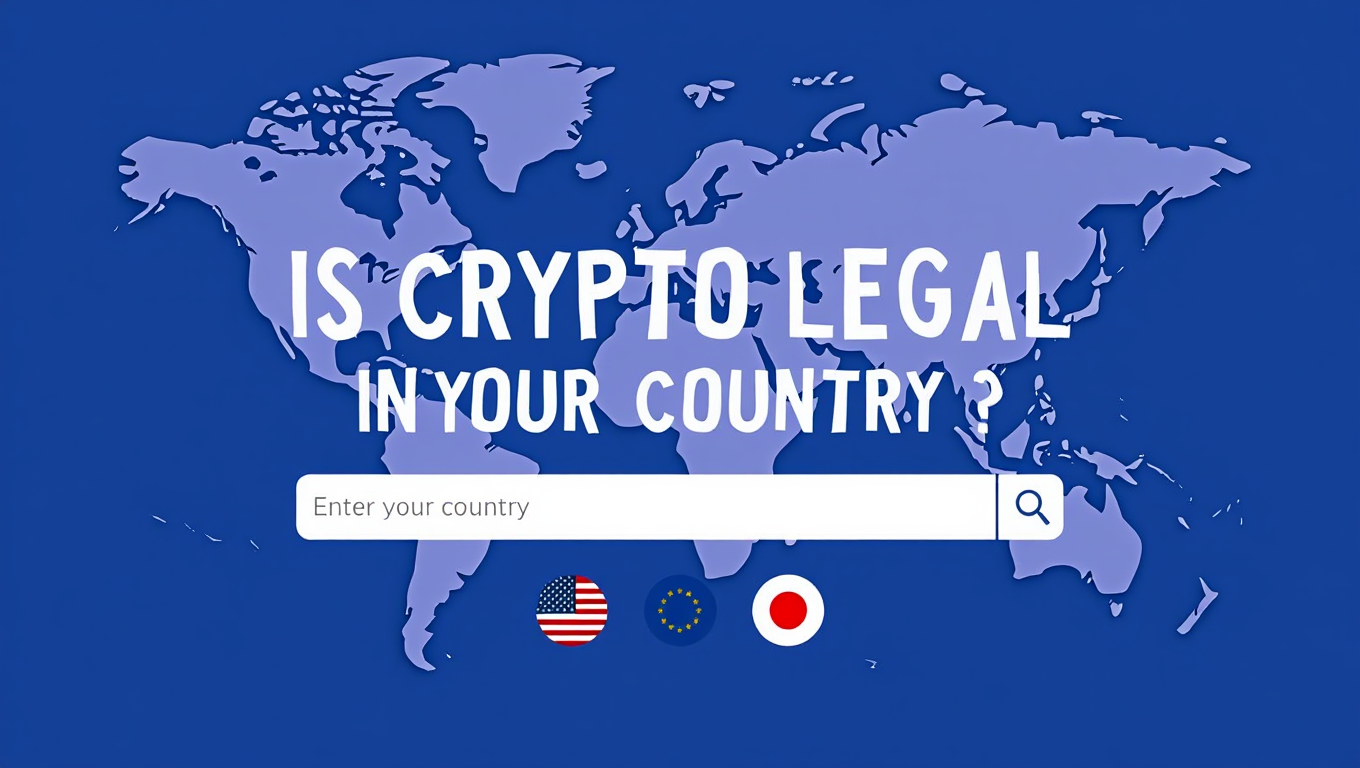Is Crypto Legal in Your Country?
Is Crypto Legal in Your Country? 2025 Regulation Guide
Cryptocurrency has surged in popularity over the past decade, transforming from a niche digital experiment into a mainstream financial asset. But as crypto adoption grows, so do questions about its legality and regulation—especially in 2025, when many governments are tightening oversight. If you’ve ever wondered, “Is crypto legal in my country?” — you’re not alone. This guide will break down the current regulatory landscape in key Tier 1 countries like the US, UK, and Canada, helping you navigate the complex world of crypto legality with confidence.
Why Does Crypto Regulation Matter?
Before diving into country-specific rules, it’s worth understanding why regulation around cryptocurrency is so important. Unlike traditional currencies controlled by central banks, cryptocurrencies operate on decentralized blockchains. This disrupts how money, investments, and even identity verification work.
Governments regulate crypto mainly to:
- Protect consumers from scams and fraud
- Prevent money laundering and illegal activities
- Ensure taxation and reporting compliance
- Maintain financial system stability
But regulation also creates challenges. Overly strict laws may stifle innovation or push crypto activity underground. Meanwhile, clear and balanced rules can foster trust and accelerate adoption.
Crypto Legal Status in the United States
The US has one of the most developed and evolving crypto regulatory frameworks, but it’s also one of the most complex due to multiple agencies involved.
Key Regulatory Bodies
- SEC (Securities and Exchange Commission): Focuses on whether tokens qualify as securities. Many initial coin offerings (ICOs) have faced SEC scrutiny.
- CFTC (Commodity Futures Trading Commission): Oversees crypto derivatives and classifies Bitcoin and Ether as commodities.
- FinCEN (Financial Crimes Enforcement Network): Requires crypto exchanges and wallet providers to comply with anti-money laundering (AML) and know-your-customer (KYC) rules.
Legal Highlights
- Cryptocurrency is legal to own, trade, and invest in, but exchanges must register with FinCEN and implement KYC procedures.
- Crypto is treated as property for tax purposes, meaning capital gains tax applies on sales or exchanges.
- Security token offerings (STOs) and some ICOs require SEC registration or exemptions.
- Decentralized finance (DeFi) and NFTs remain a regulatory gray area, but increasing scrutiny is expected.
Overall, the US encourages innovation but demands transparency and compliance, making it a relatively safe environment for crypto users.
United Kingdom: Navigating FCA Rules and Beyond
The UK’s approach balances consumer protection with crypto innovation. The Financial Conduct Authority (FCA) plays a central role in setting the tone.
What You Should Know
- The FCA regulates crypto exchanges and wallet providers under AML and counter-terrorism financing (CTF) laws.
- Crypto assets are not considered legal tender, but buying and selling are legal activities.
- The FCA banned the sale of crypto derivatives and exchange-traded notes (ETNs) to retail consumers in 2021 due to high risk.
- UK tax authority (HMRC) treats crypto gains as taxable income or capital gains, depending on the activity.
Regulatory Trends in 2025
The UK government has proposed further rules to regulate stablecoins and DeFi platforms to ensure financial stability and consumer safeguards. A potential crypto asset regime aims to provide clear licensing frameworks and foster fintech growth.
Canada’s Crypto Landscape: Growing Clarity and Control
Canada has emerged as a crypto-friendly jurisdiction with steadily increasing regulatory clarity.
Current Legal Framework
- Crypto exchanges must register with the Financial Transactions and Reports Analysis Centre of Canada (FINTRAC) and comply with AML/KYC regulations.
- The Canadian Securities Administrators (CSA) has guidelines on when cryptocurrencies and tokens qualify as securities.
- Cryptocurrency transactions are subject to taxation similar to property sales, with capital gains applicable.
Recent Developments
In 2024-2025, Canada has been actively engaging with the crypto community to build a comprehensive regulatory framework that balances innovation with consumer protection. The government is looking closely at stablecoins, DeFi protocols, and the environmental impact of mining.
What About Other Tier 1 Countries?
While the US, UK, and Canada lead in crypto regulation, other Tier 1 countries have their own evolving rules worth noting:
- Australia: Crypto is legal, and exchanges must register with AUSTRAC. The government has introduced clear tax guidelines and is exploring a digital currency regulatory sandbox.
- Germany: Recognizes crypto as financial instruments. Crypto custody services require BaFin licensing. Germany is known for its strict but clear regulatory environment.
- Singapore: Has a progressive stance with the Payment Services Act regulating crypto businesses. It’s a major crypto hub thanks to favorable policies.
Practical Tips for Crypto Users in 2025
Understanding legality is just the start. Here’s how to stay safe and compliant no matter where you live:
- Know Your Local Laws: Regulations vary widely. Check your government’s official crypto guidance or consult a legal expert.
- Use Licensed Exchanges: Opt for platforms registered with local authorities to ensure your funds and data are protected.
- Keep Records: Maintain detailed logs of your transactions for tax reporting and potential audits.
- Stay Updated: Crypto regulations evolve rapidly. Follow trusted news sources and official announcements.
- Beware of Scams: Regulatory oversight can reduce fraud but doesn’t eliminate risk. Be cautious with new projects or unsolicited offers.
Your Crypto Journey and the Law
The question, “Is crypto legal in my country?” no longer has a simple yes or no answer. The legal landscape in 2025 is dynamic, shaped by ongoing efforts to balance innovation with regulation. For Tier 1 countries like the US, UK, and Canada, cryptocurrency is largely legal but regulated—meaning that if you want to participate in the crypto economy safely and legally, staying informed and compliant is key.
Are you curious about the specific rules in your country or want tips on navigating crypto regulations? Drop a comment below—let’s chat and learn together!





No comments